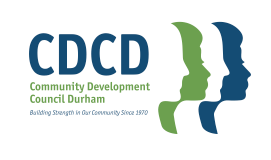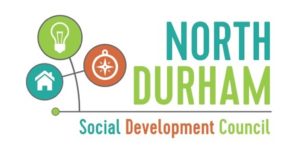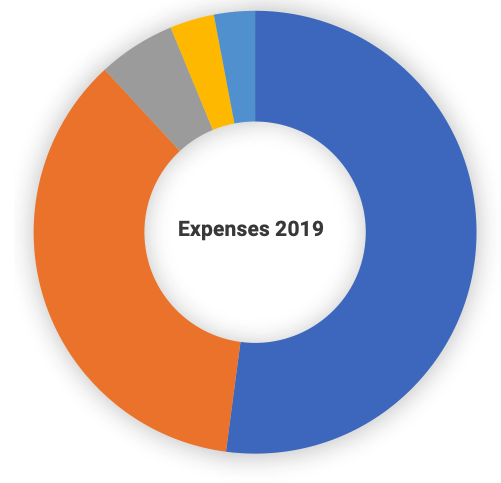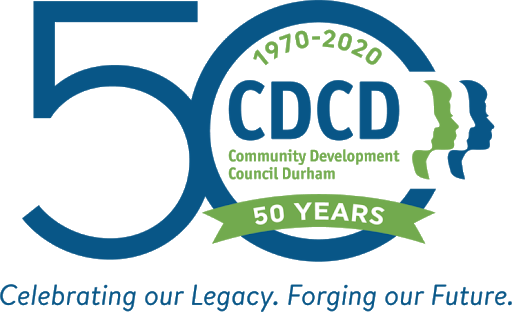
Community
Development
Council Durham
Annual
Report
2019
Interactive edition
Vision, Mission, Beliefs
Our Vision
Our vision is an equitable, inclusive and socially just community that is committed to meaningful participation for all.
Our Mission
Our mission is to identify regional community development needs
and inform relevant policy and programming, while supporting and delivering effective services.
CDCD Believes:
- In the enhancement and protection of social and economic rights and freedoms
- That innovative responses to community needs require collaborative thinking and practice
- That we must uphold and embody equity, inclusivity and social justice
- That meaningful participation is defined by both the community and the individual, and that each person should be equipped and supported with the tools and resources to enable this participation, and
- In sustainable solutions to community issues and concerns.
LAND ACKNOWLEDGEMENT

Land Acknowledgement
We acknowledge this sacred land on which we, at Community Development Council Durham (CDCD) carry out our work. It is the traditional territory of many nations including the territory of the Mississaugas of the Credit, the Anishnabeg, the Chippewa, the Haudenosaunee and the Wendat peoples and is now home to many diverse First Nations, Inuit and Métis peoples. We also acknowledge that Durham Region is covered under the Williams treaties of 1923.
We would like to acknowledge all Treaty peoples – including those who came here as settlers – as migrants either in this generation or in generations past – and those of us who came here involuntarily, particularly forcibly dis-planted Africans, brought here as a result of the Trans-Atlantic Slave Trade and Slavery.
Table of Contents
- Joint Message – Board President and Executive Director
- Our 50 Year Journey
- 50th Anniversary Videos
- CDCD Serving Durham in 2019
- Community Development and Social Research
- Projects – Social Planning in Durham
- Housing Help Durham
- Settlement Services – Orientation (Settlement) Program
- Settlement Services – Newcomer Settlement Program (NSP)
- Settlement Services – Community Connections Program
- Settlement Workers in Schools (SWIS)
JOINT MESSAGE FROM OUR LEADERSHIP
JOINT MESSAGE FROM THE PRESIDENT AND EXECUTIVE DIRECTOR
'CONNECTIONS'
As we reflect…, the word “connections” summarizes our incredible history. Throughout its years of organizational transformations, CDCD has maintained its connection to community members, partners, allies, emerging leaders, clients, volunteers, resources, and ideas.
Our deep community roots ground us in responding, in real time, to emerging community needs. Whether it is a need for a welcoming place for newcomers, immigrants and refugees, documenting and reporting on vulnerable populations like seniors and the under-housed, or creating a community garden for residents, CDCD listens acutely to community members, and connects their ideas and identified needs to programs, services, and reports.
We also connect our organization’s daily work to broader policy tables, action-oriented advocacy, and other platforms that amplify resident voices. In 2019, CDCD’s widespread connections led to:
- Federal: The Welcome Centre Immigrant Services – Ajax partnership with Immigration, Refugees and Citizenship Canada (IRCC). A series of client and service-provider focus groups were conducted in English and French, as part of a multi-phased qualitative research study to better understand some of the factors influencing whether permanent residents acquire Canadian citizenship.
- Provincial: CDCD’s undisputed support from Social Planning Network of Ontario (SPNO) to deliver Durham’s Social Planning survey, forum, and report. This was generated by community stakeholders identifying local critical issues and research gaps; this will support ongoing REGIONAL planning and discussions.
- Regional: Community Development’s collaboration with Ontario Tech’s Social Research Centre (SRC) to work on data cleaning and analysis for Homeless Individuals and Families Information System (HIFIS) reports in support of Durham Region’s coordinated access initiative.
- Municipal: Housing Department’s co-development and facilitation of the Ajax Homelessness Task Force with Ajax Counselors Lisa Bower and Joanne Dies. This brought together churches, local businesses, BIA members, service providers, mental health agencies, the local youth shelter, social workers, paramedics, and people experiencing homelessness in Ajax, and led to the implementation of locker storage for the homeless population, Doors of Compassion – Out of the Cold supports, and a Hygiene Hub.
- Local: CDCD’s active involvement with Durham Diversity, Equity and Inclusion Community of Practice (DEICoP) whose primary focus is to promote and support the removal of systemic barriers, and incorporate DEI principles within member organization’s policies and practices.
The regional response between CDCD and the City of Toronto led to Durham’s first Resettlement Assistance Program (RAP). Asylum-seeking parents and children arriving in the greater Toronto area were resettled and housed in Durham and surrounding areas. A commitment was made to house 25 refugee families; this has since doubled to 53 families and counting.
CDCD’s vast network of connections allow us to wholly support an entire family from their first steps on Canadian soil. For example, an individual or family can enter the RAP or Settlement program, find housing through our Housing Department; learn English through our partnering LINC classes, access employment supports at the Ajax Welcome Centre, receive guidance in Durham’s elementary and secondary schools from our Settlement Workers in Schools staff, and form social networks with other newcomers through our Community Connections program. Newcomers and housing clients can be assured that the agency’s programs and services are grounded in evidence-based best practices that are led by our Community Research and Development Department which inform our holistic service-delivery approaches.
In 2019, we continued to grow as an organization, focusing our connections to each other as colleagues and between departments. Our strategic plan incorporated an honest review of our strengths,
and identified where we could build capacity. Our connection to the Board of Directors allowed us to take risks, review our internal needs, invest deeply in our staff and our organization, and build strong, solid foundations. Through strong management and staff’s renewed commitment, we are in a healthy and stable financial position.
Over the last year, we continued to focus on our four buzzwords – Resilient, Innovative, Strategic, and Excellence (RISE). Looking ahead to 2021, we know that the shape of our programs and services will be impacted by the COVID-19 pandemic, and we expect that we will have to continue to collaborate and innovate in order to continue to provide responsive services to community needs.
Our connections will move us forward in mitigating any challenges and in navigating new opportunities. As the landscape of Durham Region changes, CDCD will continue to provide quality services and programs, and connect community issues to real systemic change across multiple stakeholders.
We are, and will always be, a nexus of connections and ideas, fueled by caring staff, that both serves and strengthens our community.

Roger Ramkissoon
Board President


Hermia Corbette
Executive Director

50 YEAR TIMELINE
The Road So Far - 50 Years and Counting

CDCD SERVING DURHAM 2019
CDCD Serving Durham in 2019
Ajax Welcome Centre programs were accessed 59,466 times.
1,579 unique service users engaged in Centre-led initiatives.
Settlement Workers in Schools delivered 12,975 engagements across 180 schools.
Newcomer Settlement Program served a total of 1,892 clients, which included 1,029 new clients and 863 repeat clients.
HSP assisted with eviction prevention by disbursing approximately $1.4 million in financial assistance to over 3,753 Durham Region residents.
Community Connections helped 2,276 newcomers integrate into the Canadian lifestyle through activities like English and French Conversation Circles which benefited 1,974 newcomers.
Orientation Program served 2,313 clients, which included 991 new clients and over 1,322 repeat clients.
Resettlement Assistance Program served 35 families made up of 133 individuals, from October to December 2019.
LEAP disbursed approximately $62,000 in financial assistance for hydro arrears to 144 households.
COMMUNITY DEVELOPMENT
Community Development and Social Research
The Community Development and Social Research department is at the core of CDCD’s Vision of an equitable, inclusive, and socially just community that is committed to meaningful participation for all.
Community development is the process of developing active and sustainable communities based on principles of justice, inclusion, and mutual respect. We achieve this through work in areas such as:
- Collaborative Program and Social Planning
- Public Education and Awareness
- Community-Based Research
- Facilitation and Training
- Policy Analysis and Development
- Asset Mapping and Gap Analysis
The community is central to all of this work, both defining and participating in our community development, research and social planning initiatives. As a member of Social Planning Network of Ontario, our work follows their operating principles:
- Community Accountability
- Knowledge-based Action
- Citizen Participation
- Inclusiveness
- Empowerment
- Integrated, Holistic Perspective
PROJECTS
PROJECTS
Social Planning in Durham
CDCD developed and distributed surveys to stakeholders across Durham Region. The survey, which received nearly 90 responses, helped identify local needs and issues. The information was used to map how social planning and research strategies could support local priorities through service development and data collection.
On May 29, over 30 local stakeholders participated in a forum to discuss the results and inform the summary report. The forum was facilitated by Peter Clutterbuck, former Chair of Social Planning Network of Ontario (SPNO). He contextualized the survey results and spoke to the history of social planning in Ontario, connecting history to CDCD’s future social planning efforts. The summary report can be viewed on our website www.cdcd.org

The Leadership Durham program graduated its largest cohort in 2019 with 18 participants from across Durham Region. As a Community Leadership Program (CLP), Leadership Durham provides participatory professional-development training on meaningful topics to emerging leaders who work, live, or serve on boards in our community. Participants also work on projects for non-profit organizations during the 10-month program. In addition to the program, CDCD was proud to host the first ever CLP Forum in October of 2019 at Whitby’s Station Gallery. This featured representatives from Leadership Niagara and the Peel Leadership Centre and celebrated alumni of the Durham program.
PROJECTS
PROJECTS
Ajax Homelessness Task Force
In 2019, CDCD initiated the Ajax Homelessness Task Force in collaboration with community partners. Members of the Task Force included community agencies, politicians, community members, and representatives from the faith community who gathered to discuss issues of homelessness arising in Ajax, and to advocate for solutions.
The Task Force contributed to 2 projects in their first year of existence; they successfully advocated for funds towards the construction of lockers for homeless individuals in Ajax; and supported the application for “Doors of Compassion” an Out of the Cold service delivered by the Christian Faith Outreach Centre. The Task Force also shares services and resources such as food, clothing, and volunteer work throughout the Ajax community.

North Durham Social Development Council
The Community Development department facilitates this long-standing social planning council with cooperation from North Durham partners. In 2019, the North Durham Social Development Council (NDSDC) produced 4 interagency meetings throughout Uxbridge, Brock, and Scugog, and identified advocacy strategies for 2020 and beyond.
Age Friendly Oshawa
CDCD participated in the Age-Friendly Oshawa Steering Committee. This group hosted focus groups, community forums, and developed surveys. Shortly after an age-friendly strategy was adopted by the City of Oshawa, with Oshawa Seniors Community Centre as project lead, the City of Oshawa was designated an Age-Friendly City by the World Health Organization.
Homeless Individuals and Families Information System (HIFIS) Community Coordination
The HIFIS Community Coordinator is responsible for developing and sustaining working relationships with key stakeholders in the community, with the overall goal to improve and encourage data collection in the housing/homelessness sector.
In 2019, we began to understand the benefits of the HIFIS 4.0 platform; the platform enabled agencies to offer more coordinated service delivery in building a network of collaborative service provision focused on ending chronic homelessness in our community.
Housing help durham
HOUSING HELP DURHAM
Housing Help Durham provides direct personal support services to assist clients with housing needs including advocacy, mediation, and general information on landlord and tenant matters, along with making proper referrals to other programs and community services. The team’s goal is to continue to strengthen existing partnerships and create new ones in hopes of bringing frontline housing services to its clients. Housing Help Durham is funded by the Regional Municipality of Durham and the Province of Ontario.
Housing Outreach Program
The Housing Outreach Team continued to offer one-on-one support and housing outreach services to clients. These services include helping clients obtain or retain their housing, supporting clients at the Landlord and Tenant Board (LTB), and connecting clients who were facing homelessness to additional resources.
Partnerships with the Ajax and Pickering Public Libraries remained strong. A member of the Housing Outreach team was onsite at the libraries once a month to provide client service and information. The team was also available at Carea in Ajax to provide support and walk-in services to clients looking to access housing supports. The team assisted clients with registering with the Ontario Electricity Support Program (OESP), which offers low to moderate income households a reduction in their monthly hydro costs.
The Outreach team also had the privilege of being trained as a Rent Smart Community Educators, and can now offer housing retention training to clients, increasing the likelihood of a successful tenancy. The training ultimately increases housing stability, prevents homelessness, and contributes to a more vibrant community.

Housing Stability Program
The Housing Stability Program (HSP) provides qualified Durham households with funding for rent arrears, utility arrears, and assistance with last-month’s rent and/or moving costs. HSP assisted with eviction prevention by disbursing approximately $1.4 million in financial assistance to over 3,753 Durham Region residents.
Low-Income Energy Assistance Program
CDCD continues to operate the Low-Income Energy Assistance Program (LEAP) for Oshawa PUC and Whitby Hydro. LEAP provides one-time financial grants to qualified households with hydro arrears. In 2019, LEAP disbursed approximately $62,000 in financial assistance for hydro arrears to 144 households.
SETTLEMENT SERVICES
SETTLEMENT SERVICES
Orientation (Settlement) Program
Funded by Immigration, Refugee and Citizenship Canada (IRCC), the Orientation program offers a safe and confidential space for newcomers to:
- seek information about life in Canada
- receive answers to common questions about Canadian systems, Canadian rights and Canadian responsibilities
- access referrals to local services
- get support with immigration documentation
- acquire supports such as housing, employment, education, child tax benefits, child care, health care among others.
An Orientation appointment begins with a client-focused and client-driven intake and needs assessment allowing clients to express their needs, receive appropriate referrals, and develop self-defined settlement plans.
Through this service, individuals and families also receive (non-therapeutic) counselling supports to help newcomers deal with the difficulties faced when adjusting to their life in Canada. Our dedicated team of 5 Orientation workers speaks a total of 13 languages. This essential resource helps Permanent Residents, Convention Refugees, and Caregivers whose first language is not English, to effectively convey their needs and concerns in their native tongue. Clients are then referred to appropriate services using a warm hand-off strategy, where they are introduced to their referral source through a worker, who is responsible for communicating client needs. The warm handoff method prioritizes the uniqueness of each client and minimizes miscommunication.
In 2019, the Orientation Workers organized various group workshops in partnership with other agencies for clients to learn about topics such as:
- Income tax preparation
- Information about vaccination and pre-natal clinics offered by Public Health
- Starting a Small Business
- Service Ontario and Service Canada resources
- Rights and Responsibilities
Newcomers have a strong desire to succeed and to feel a sense of belonging in their new country. This team of diverse and highly skilled staff, who have lived experiences as immigrants, works diligently with clients to ensure their settlement journey is well-informed. As experts in settlement services, they remain committed to accelerating the engagement and success of newcomers.
2, 313 clients were served by the Orientation Settlement Workers, which included 991 new clients and over 1,322 repeat clients.
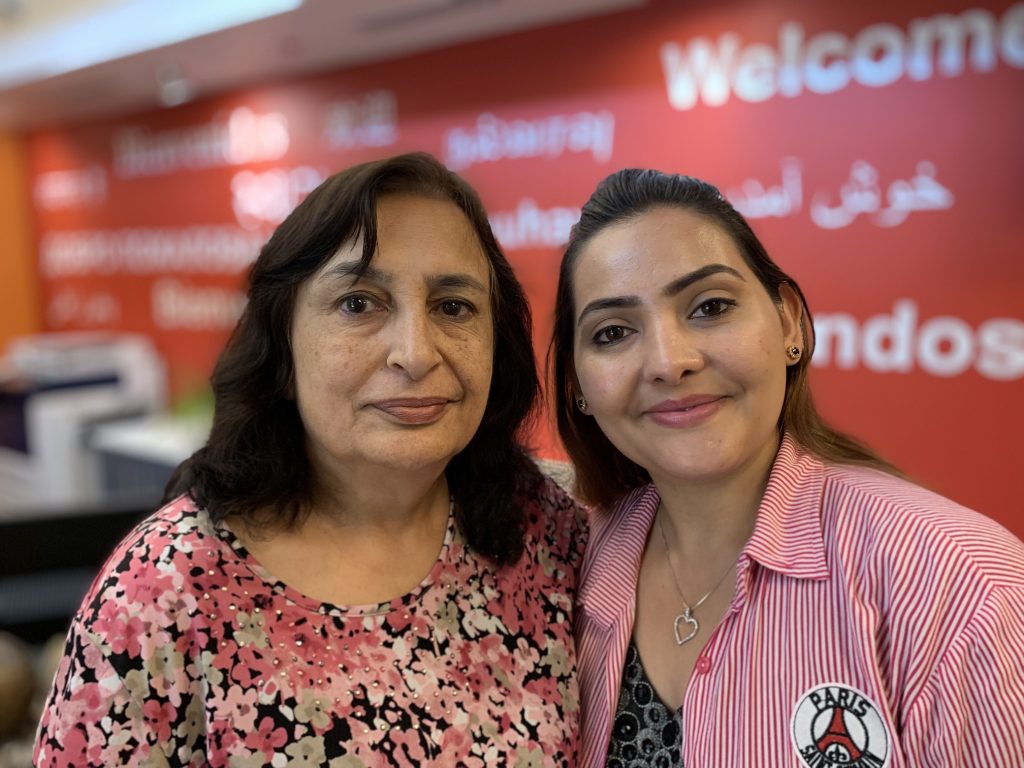
NEWCOMER SETTLEMENT PROGRAM
NEWCOMER SETTLEMENT PROGRAM (NSP)
The Newcomer Settlement Program (NSP) promotes the successful settlement and integration of newcomers including citizens, immigrants, visitors, refugees, international students, and internationally-trained professionals through the provision of early settlement and long-term integration supports. Clients access this free service at any stage of their settlement journey and are encouraged to engage in all aspects of Canadian life – socially, economically, and politically – to fully participate and contribute to the local community.
The program is delivered at four different locations in Durham:
Ajax, Pickering, Oshawa, and Whitby, catering to the needs of the clients. The NSP staff is professional and passionate in their efforts to eliminate obstacles faced by newcomers. They provide a strong voice as advocates for their clients.
Languages of service provision:
English, Tamil, Arabic.

COMMUNITY CONNECTIONS
COMMUNITY CONNECTIONS
In 2019, the Community Connections Program helped 2,276 newcomers integrate into the Canadian lifestyle, providing them with social supports to ease the transition. Through a variety of group activities, newcomer individuals, seniors, and families practice English and French in Conversation Circles, learn about their community, share stories and experiences, participate in informative workshops, develop social networks, make new friends, and connect with settled Canadians.
Community Connections is funded by Immigration, Refugees and Citizenship Canada (IRCC) and serves eligible clients including permanent residents, convention refugees, and caregivers.
The program delivers weekly signature activities that are held year-round at partnering locations across the Region:
- A robust volunteer program made up of local residents who help organize and implement 389 Community Connections activities annually
- Community Garden (in summer)
- English/French Conversation Circles
- Newcomer Walking Group
- Newcomer Women’s Group
- Newcomer Community Kitchen
- Newcomer Seniors Group
- Newcomer Family and Ladies Social
As a key contributor to two-way integration between new immigrants and local Durham residents, Community Connections hosted special one-time activities in 2019 that brought these parties together. These activities included:
- Back2Nature Hiking Trip and Enniskillen Conservation Area Hiking Trip
- Blueberry picking at Wilmot Farm
- Newcomer Picnic and Ice Cream Social
- “Group of Five” workshops for service providers, private sponsorship groups, and clients providing information on how to sponsor family members who are refugees
- Hand Reflexology Workshop
- Handwriting Workshop for Newcomers to teach and improve cursive writing technique
- Newcomer Kids Kitchen
- Pickle Ball 101
- Introduction to Chinese Dominoes
In 2019, Community Connections clients participated and informed the Town of Ajax by means of:
- The Age-Friendly Community Plan, which focused on ensuring that policies, programs, services, and spaces will be designed to support active aging in Ajax.
- The Recreation and Parks Master Plan, to guide the way in which recreation and parks facilities, programs, and services are provided to Ajax residents over the next 10-year period
SETTLEMENT WORKERS IN SCHOOLS (SWIS)
SETTLEMENT WORKERS IN SCHOOLS (SWIS)
Settlement Workers in Schools (SWIS) team had a very exciting year in 2019. The SWIS team assisted newcomer youth and their families to adapt to Canadian life, providing ongoing guidance and helping them to navigate resources and information in Durham’s elementary and secondary schools.
SWIS promotes a sense of belonging among newcomer youth through encouraging participation in their new communities.
The SWIS team of nine multi-lingual staff, speak a total of 13 languages and service over 180 schools across the Region. The team is committed to providing quality, initial-settlement services to newcomer families with school-aged children. Services are confidential, culturally appropriate, non-judgmental, and sensitive to the needs of all clients using an inclusive and accessible approach that empowers and fosters client independence.
The 10-year partnership between SWIS and the Durham Catholic District School Board (DCDSB) and the Durham District School Board (DDSB) remains strong and continues to thrive. SWIS is well-integrated into our local schools as a regular aspect of school life and culture. Group activity in schools is a central component of two-way integration and cultural transfer between long-time residents and newcomer students.
SWIS’s Making Connections event was held on November 15, 2019 at Donald A. Wilson Secondary School in Whitby.
They had a record-breaking attendance of 198 students participating in the day’s programming:
- Durham Region Police Services provided information about the Youth in Policing program and on cyber bullying.
- A workshop on mental wellness was presented by Durham Mental Health Services.
- A Job Search Workshop presented by the Pickering Welcome Centre.
- Three workshops were presented by SWIS: Leadership, Fraud Prevention, and Post-Secondary Education.
In 2019, SWIS enjoyed good participation at their annual signature programs:
- Welcome and Information for Newcomers (WIN) is a program for families with elementary-school-aged students. Newcomer families explored the elementary-school experience through a “WIN Walk” tour of the school, a healthy lunch demonstration, and a dressing-for-winter presentation. Parents were also connected to community resources such as dental and immunization services.
- Newcomer Orientation Week (NOW) is a program for high school students. For many newcomer students, high school in Ontario is very different from their previous school; the first few months can be stressful. A key feature of the NOW program is the role of Peer Leaders, high school students who are trained to run the program with the support of teachers and the SWIS team.
- The NOW parents attended an information session to orient themselves to the SWIS program and the school system in Ontario. Many parents stayed behind after the session to further engage with the SWIS team and the guest presenters.
Success Stories
M.S., a part-time job through SWIS referrals and was very overjoyed to be selected as the Peer Leader (PL) of his school in 2019 for the Newcomers Orientation Week (NOW).
WELCOME CENTRE – AJAX
Welcome Centre Immigrant Services – Ajax
Funded by Immigration, Refugees and Citizenship Canada (IRCC), Welcome Centre Immigrant Services – Ajax is well-known for its one-stop services designed to guide and support immigrants in Durham Region. The Centre is a welcoming and inclusive environment that addresses the complex and changing needs of newcomers. The service delivery approach that is utilized is integrated, flexible, and holistic. It enables a broad range of cross-sector services and expertise to be provided to immigrants under one roof. Ajax Welcome Centre services are delivered by Core Partners that offer: settlement and integration services, English language training, accreditation and qualifications information, and employment supports. Over 40 Associate Partners deliver services such as legal services, mental health services, and culturally-appropriate family counselling, based on our local community needs.
The Ajax Welcome Centre promotes client engagement, professional networking, and connections to local services and the community.
Successes for 2019 include:
- In recognition of Financial Literacy Month, The Ajax Welcome, alongside several Associate Partner community agencies and volunteers organized a Financial Literacy Forum, “Manage Your Money, Manage Your Life” held at Bolton C. Falby Public School in Ajax. The free event provided information to newcomers and their families that focused on ways to save, protect and stretch their money. Moving and settling to a new country can be stressful in many different ways, including financially, and the information shared through the workshops provided attendees with knowledge to better manage their finances: using credit wisely, managing debt, avoiding fraud and financial abuse, feeding families on a budget, and saving for children’s future education.
- The Ajax Welcome Centre’s free tax clinic assisted over 400 newcomers and low income families with filing their tax returns from February 20 to April 30, 2019. This generated more than $1,535,829.55 in benefits for clients who were eligible for HST/GST, Ontario Trillium and the Canada Child Benefit.
- Over the holiday season, the Ajax Welcome Centre organized a Holiday Toy Drive and provided gifts for 174 newcomer families, with a total of 366 children. This initiative was made possible with the support from the Durham Regional Police Services, Ajax Outspoken Speakers Toastmasters Club, and Southside Worship Centre.
- Multicultural Play To Learn, was open to newcomers and new Canadians with children birth to six years of age and their older siblings. This activity enabled families to meet other parents/caregivers; they enjoyed preparing a healthy snack and circle time together and learned about parenting in Canada and the resources available in the community.
Feedback from the clients – Ajax Welcome Centre’s free tax clinic:

RESETTLEMENT ASSISTANCE PROGRAM (RAP)
RESETTLEMENT ASSISTANCE PROGRAM (RAP)
The City of Toronto funded Durham’s first Resettlement Assistance Program (RAP) as part of the Greater Toronto Refugee Resettlement and Regional Housing Strategy for asylum-seeking families. The program helps refugee families with children become resettled and housed in the Region of Durham and surrounding communities.
Successes for October to December, 2019 include:
- Within the first three weeks of operation, 25 reserved rooms were fully occupied by a total of 22 refugee families comprised of 37 adults and 50 children.
- Initial orientation was conducted to help newly-arrived families become familiar with the shelter (hotel) environment and Durham Region.
- Resettlement appointments were arranged with each family. Comprehensive intake and needs assessments were completed in order to identify the immediate needs of the families, build rapport with clients, and prioritize referrals for community supports.
Some of the immediate needs were:
- Change of address for refugee application and work permit application
- Children’s education and school enrollment
- Ontario Works file transfer
- Locating and securing suitable housing
- Adult’s language assessment and ESL classes
- Finding a local medical clinic and family doctors, accessing Interim Federal Health Program (IFHP) coverage
- In order to assist the families with their needs, CDCD initiated partnerships with other service providers and introduced activities such as:
- Homework Club, Youth Drop-in Program, Movie Nights for all children, and Reading Circle
- Family Time for both parents and children, and an Adult Social
- A Toy Drive with Santa, a Holiday Dinner, and a New Year’s Eve celebration
- Monthly events and workshops, including:
- Monthly orientation for new families
- Housing support and tenant rights information
- Ontario’s Education System
- Healthy parenting sessions
- Health and medical services sessions
- Dressing for the Winter, and Winter Break recreational activities
- The banking system in Canada
Overall, RAP have been successful in the short time it was implemented by:
- Supporting and meeting the needs of families at the RAP site.
- Providing discharge packages to family’s transitioning from the RAP to permanent housing. The package contained relevant social and community resources that exist near their new residence.
- Following up with families that have secured permanent housing through bi-weekly check-ins with the RAP team via email or telephone.
The Resettlement Assistance Program (RAP) served 35 families and 133 individuals by end of 2019. 36 Children enrolled in elementary and high schools, and 125 clients accessed Newcomer Settlement Program (NSP).
Clients' Testimonials:
FINANCIAL STATEMENTS
FINANCIAL STATEMENTS
Please note the charts presented are based on CDCD’s Audited Financial Statements which were prepared by RMS. To view the full version, please go to www.cdcd.org
CURRENT STAFF
STAFF MEMBERS
Executive and Administrative Office
Hermia Corbette, Executive Director
Nancy Diltz, Finance Manager
Erick Sanchez, IT Administrator
Sanket Shah, Accounting Clerk
Caroline Ross, HR Generalist
MANAGERS AND TEAM LEADS
Vanessa Bilenduke, Community Services Manager
Wosen Beyene, Welcome Centre and Immigration Services – Ajax Manager
Ashley McDonald, Housing Team Lead
Dilenia Teaz, Interim Welcome Centre and Settlement Services Team Lead
Vicki Kerr, Interim SWIS and Community Connections Team Lead
Patricia Liang, Resettlement Assistance Program (RAP) Team Lead
Nathan Gardner, Community Development Team Lead
SETTLEMENT SERVICES
Hanna Siekowski, Settlement Program Assistant
Newcomer Settlement Program (NSP)
Asma Mohran, NSP Worker
Nalayini Ravindranath, NSP Worker – contract
Paliny Kanagalingam, NSP Worker*
Orientation Program
Mohammad Sohail, Orientation Worker
Parvin Syal, Orientation Worker
Rahime Solak, Orientation Worker
Teresita Perera, Orientation Worker
Community Connections Program
Alana Andrews, Community Connections Worker
Bozena Stobinska, Community Connections Worker
Katelin Grant, Community Connections Worker
Maria Abogado, Community Connections Worker
Settlement Workers in Schools (SWIS)
Aloma Selvarajha, SWIS Worker
Carmen Subibi, SWIS Worker
Joy Tan, SWIS Worker
Maribel Cabral de Sousa, SWIS Worker
May Toma, SWIS Worker
Najeeb Nayab, SWIS Worker
Soraya Attai, SWIS Worker
Community Development
Neemarie Alam, Social Researcher
Monika Warsinska, HIFIS Community Coordinator
Damario Squire, PitCount Coordinator/Community Development Worker
STAFF TRIBUTE
We are forever thankful to all the dedicated staff who supported the agency from 1970 to 2019. They were instrumental in helping us achieve our client-first approach, which remains at the core of everything we do.
The CDCD Board of Directors and Management Team would like to thank and extend our appreciation to all of our staff for the work done every day to provide quality services and programs to the residents of the Region of Durham. Their continued passion and enthusiasm for serving our clients is a daily inspiration, and the reason we have had the privilege to serve our community for 50 years. Thank you and congratulations to our entire staff!
HOUSING
Dawn Stewart, Housing Stability Worker
Emily Buckley, Intake Worker and Receptionist
Geralda Bray, Outreach Worker
Jacinta Arokiasamy, Housing Coordinator
Jennifer Mackay, Outreach Worker
Niki Goulden, Housing Stability Worker
Megha Thapar, Housing Database Entry Clerk/Receptionist
Welcome Centre Immigrant Services - Ajax
Darlene Bahlmann-Huber, Administrative Assistant/Receptionist
Donette Ambris, Administrative Assistant/Receptionist
Guler Korkmaz, Administrative Assistant/Receptionist
Resettlement Assistance Program (RAP)
Henock Teklemariam, Resettlement Worker
Alaa Aldwik, Resettlement Worker
Kadia Baugh-Williams, Resettlement Worker – contract
Ben Kong, Overnight Relief Resettlement Worker
Brigitte Schoerkhuber, Resettlement Assistance Housing Worker
BOARD MEMBERS
BOARD MEMBERS
The Board of Directors consists of up to 11 volunteer Directors and includes a President, Vice-President, Treasurer, and Secretary. These dedicated individuals administered overall governance and oversight to CDCD throughout 2019 by meeting at least once per month throughout the year to ensure they provided quality leadership and care for the organization. We would like to express our sincere thanks to these dedicated Directors for their service throughout 2019!
Roger Ramkissoon
Michelle Davis
Hilary Smith
Audette James
Portia Daisy
Melissa Batchellor
VOLUNTEER ENGAGEMENT
Volunteer Engagement
We believe that volunteers are our best asset! The assistance offered by volunteers is vital to our clients and is essential to providing client-centred services. We believe that our volunteers are a reflection of, and an invaluable resource, to our community.
Thank you to CDCD’s amazing volunteers.
Our volunteers made a difference in so many individuals’ lives! We could not have asked for a more dedicated group of volunteers and words cannot express how grateful we are to have you!

THANK YOU

- 458 Fairall St., Unit 4, Ajax, ON, L1S 1R6
- +1 905 686-2661
- +1 905 686-4157
- info@cdcd.org
- www.cdcd.org
- CDCDurham
- @CDCDurham
- @CDCDurham
- Charitable Registration # 130979826RR0001
